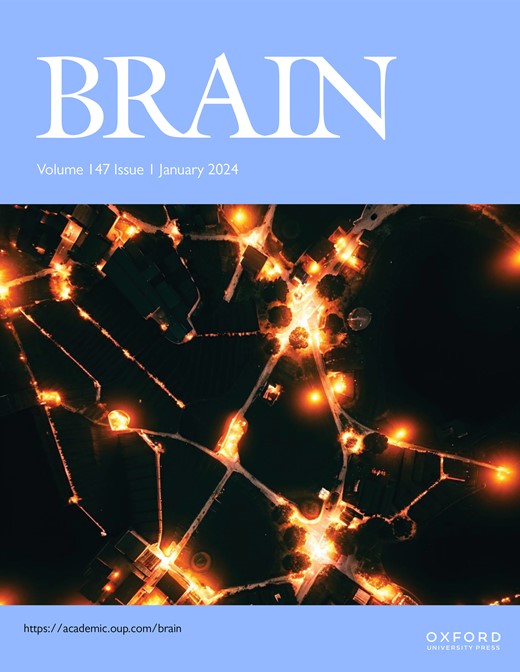KIF2A下调将淀粉样蛋白-β与阿尔茨海默病中的Tau磷酸化联系起来
IF 11.7
1区 医学
Q1 CLINICAL NEUROLOGY
引用次数: 0
摘要
微管(MT)是细胞骨架的重要组成部分。MT和MT相关蛋白的功能障碍是神经退行性疾病的显著特征。在阿尔茨海默病(AD)中,MT组成的改变和Tau蛋白的过度磷酸化与神经退行性变的关系比淀粉样斑块的形成更密切。然而,β淀粉样蛋白(Aβ)的积累是AD病理的最早事件,并诱导Tau毒性。KIF2A是一种微管去极化运动蛋白,在皮质发育过程中起重要作用。KIF2A在成熟的大脑中保持表达,这是神经元存活所必需的。在这里,我们使用有条件的方法在成年小鼠皮层和海马中特异性地切除KIF2A,以评估KIF2A缺失对神经元存活和Tau磷酸化的影响。我们发现KIF2A缺乏导致树突棘密度减少和与认知能力下降相关的成熟,随后通过ERK1/2激活Tau磷酸化增加。我们还研究了KIF2A在5xFAD小鼠模型和死后人脑组织中的表达。我们报道,Aβ积累改变了神经元中KIF2A的表达,最重要的是,AD患者的KIF2A蛋白水平急剧降低,而其他原发性牛头病变患者则没有。我们的研究结果揭示了AD背景下Aβ积累、KIF2A失调、微管功能障碍和Tau磷酸化增强之间的关系。本文章由计算机程序翻译,如有差异,请以英文原文为准。
KIF2A downregulation links amyloid-β to Tau phosphorylation in Alzheimer's disease
Microtubules (MT) are essential components of the cytoskeleton. Dysfunctions of MT and MT-associated proteins are prominent features of neurodegenerative disorders. In Alzheimer's disease (AD), changes in MT composition and hyperphosphorylation of Tau are more closely related to neurodegeneration than amyloid plaque formation. However, the accumulation of amyloid beta (Aβ) species is the earliest event in AD pathology and induces Tau toxicity. KIF2A is a microtubule depolarizing kinesin with important roles during cortical development. KIF2A expression is maintained in the mature brain, where it is required for neuronal survival. Here, we used a conditional approach to ablate KIF2A specifically in the adult mouse cortex and hippocampus to assess the impact of KIF2A deletion on neuronal survival and Tau phosphorylation. We found that KIF2A deficiency leads to a reduction of dendritic spine density and maturation associated with cognitive decline, followed by an increase in Tau phosphorylation through ERK1/2 activation. We also studied KIF2A expression in 5xFAD mouse model and post-mortem human brain tissue. We report that Aβ accumulation alters KIF2A expression in neurons and most importantly, KIF2A protein levels are drastically reduced in AD patients but not in patients with other primary Tauopathies. Our results shed light on the relationship between Aβ accumulation, KIF2A deregulation, microtubule dysfunction, and enhanced Tau phosphorylation in the context of AD.
求助全文
通过发布文献求助,成功后即可免费获取论文全文。
去求助
来源期刊

Brain
医学-临床神经学
CiteScore
20.30
自引率
4.10%
发文量
458
审稿时长
3-6 weeks
期刊介绍:
Brain, a journal focused on clinical neurology and translational neuroscience, has been publishing landmark papers since 1878. The journal aims to expand its scope by including studies that shed light on disease mechanisms and conducting innovative clinical trials for brain disorders. With a wide range of topics covered, the Editorial Board represents the international readership and diverse coverage of the journal. Accepted articles are promptly posted online, typically within a few weeks of acceptance. As of 2022, Brain holds an impressive impact factor of 14.5, according to the Journal Citation Reports.
 求助内容:
求助内容: 应助结果提醒方式:
应助结果提醒方式:


